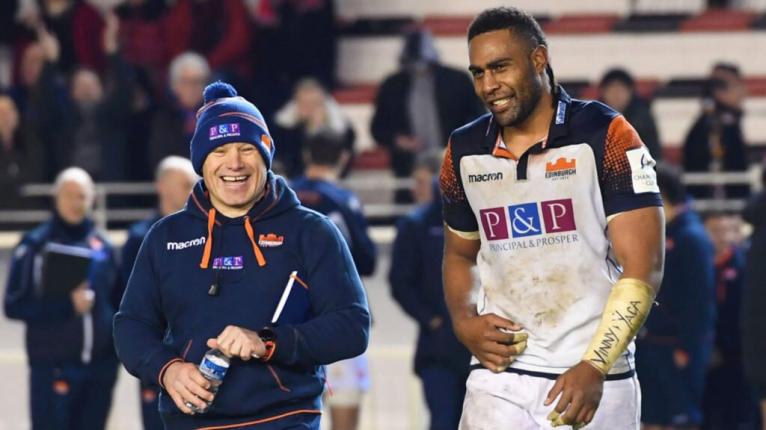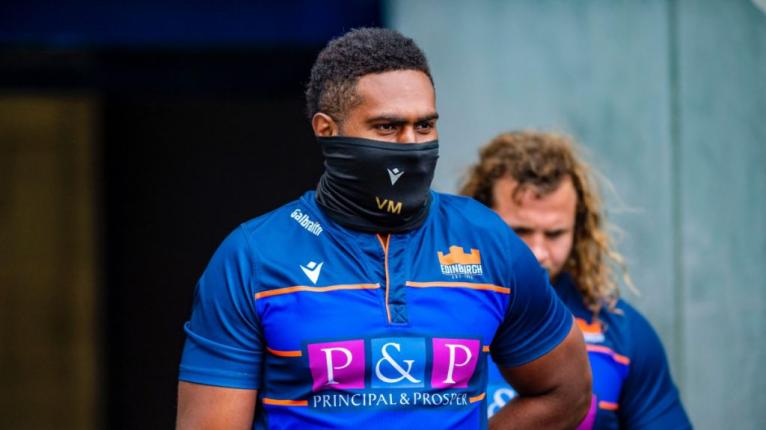Viliame Mata had never been to Scotland and when he first touched down in Edinburgh, Big Bill was not a fan. It is hard to imagine a more violently different backdrop to the Fijian archipelago than the Scottish capital in winter and Mata wondered how he’d ever last. Eight years, two World Cups and three children later, he is one of Scotland’s finest ever overseas recruits and, it is understood, the highest paid player in the country.
Mata was signed back in 2016, fresh from his stupendous role in the inaugural Olympic sevens title. When the contract offer appeared, the conversation with Wati, Mata’s wife, went something like this:
“I’ve got an offer from Edinburgh – we should go.”
“Where’s Edinburgh?”
“I’m not sure, but it’s near London.”
Wati had never been on a plane before. Her husband had left Fiji only to participate in sevens tournaments.

There were times in those early days when the Matas pined for home and despaired at the place they had come to. The cold, the darkness, the long list of alien things. And that might have been the end of Mata in Edinburgh, and a hero Scottish rugby folk have long worshipped, were it not for a few crucial things.
The first was Mata’s resolve. You don’t win Olympic gold without serious inner steel and a heck of a slog to get there. The second was the community placed around him. He found people with precious ties to the islands, Pasifika men in the pro-teams and the armed forces, allies to help him and his family settle. They would meet for barbecues and host kava sessions. Ben Atiga, the former All Black working in Scottish Rugby’s aftercare initiative, visited the Matas on a near-weekly basis.
To state Richard Cockerill took a shine to Mata would be like saying Augustus Gloop was partial to a chocolate bar. When he took charge at Edinburgh in 2017, the Englishman hired Nick Lumley, who had witnessed Mata’s excellence as a strength and conditioning coach on the sevens circuit, and went to work sculpting his enormous physique. Mata spent hours in the windowless bowels of Murrayfield astride the dreaded Wattbike. Lumley had even been known to accompany players to the supermarket and show them what to put in their basket.
Cockerill joked more than once about choosing Mata over his wife and children, or selling a few organs to fund a contract extension.
Edinburgh have moulded elements of their game around Mata, the goal to give him as many touches as possible, where he could hoover up yards, smithereen defenders and flick delicious passes. They put him in a back-row containing dogs of war – John Barclay, Hamish Watson, John Hardie, Jamie Ritchie, Luke Crosbie and others – fetchers who could pilfer ball and let Mata worry chiefly about carting it forwards, again and again and again. His work rate, in getting into these positions then inflicting the punishment, is phenomenal.
And so, with the unwavering belief of a coach and the support of his community, we saw the very best of Big Bill. In Cockerill’s second season, Edinburgh made the Champions Cup quarter-finals and Mata was their barnstorming titan. They stunned Toulon away and walloped them at home, Mata unleashing a glorious one-handed offload to send James Johnstone scampering under the Stade Mayol sticks. He was hitting twenty carries per game more often than not and topping all sorts of attacking metrics. He was the form number eight in Europe, if not the world. Cockerill joked more than once about choosing Mata over his wife and children, or selling a few organs to fund a contract extension.

It is no coincidence that while Mata has been thoroughly content in Edinburgh, those standards have seldom slipped even though the team is on its fourth head coach since he arrived. His family life is stable and happy and he feels supported by his employers. Numerous French presidents have licked their lips at the prospect of wielding such a weapon, but none have managed to lure him. Scottish Rugby ponied up and forked out over £400,000 a year. Only now, with the union keeping a close eye on its budgets, and Bristol Bears putting a fat cheque on the table, will the giant depart in the summer having given many of his prime years to Edinburgh.
Bristol have not justified their lavish expenditure these past two seasons, but Mata will fit beautifully into Pat Lam’s attacking shape. He will have freedom to maximise his strengths and be encouraged to get paws on ball at every opportunity.
At 32, Mata is at the top of his game. His performances in the lead-up to, and during, the World Cup were supreme. He is now a history-maker in sevens and XVs for his proud island nation. Simon Raiwalui, who coached Fiji in France, recently remarked: “He came in underdone due to the finish date of URC and start date of Rugby World Cup preparation. Had some dark moments but pushed through it like the champion he is. Was an absolute rock for the team. For me he was one of the best number eights in the world this year.”
Overtures have been made to Tom Roebuck and Arron Reed at Sale, Fin Smith at Northampton, and others further afield.
And still incredibly durable. Thirteen days after his blockbuster try in the quarter-final loss to England, Mata played 80 minutes for Edinburgh against the Lions.
The Mata tale underscores the importance of recruitment in Scotland, a delicate balancing act which can easy be knocked out of equilibrium. With only two professional sides, there is substantial pressure to develop Scottish-reared, or at least Scottish-qualified, talent for the national team. Too many young players are involved in far too little rugby so a foreigner cannot clog the pathway further.
But these clubs are formidably resourced and there are greater expectations placed upon them than ever before. Coaches bear the brunt of this and sometimes, that is reflected in recruitment and selection. For Glasgow and Edinburgh should be operating near the top of the URC and qualifying for the Champions Cup knockouts.
Each is laden with current internationals who depart en masse several times a season and have their workloads carefully managed. Even though the URC no longer stages matches on international weekends, the big dogs still miss chunks of a campaign. And those big dogs are occupying most of a considerable, but not limitless, budget. Whatever portion remains is precious and any new arrival must justify the outlay to land him.
Scottish Rugby continues to aggressively pursue eligible talent beyond its borders. Overtures have been made to Tom Roebuck and Arron Reed at Sale, Fin Smith at Northampton, and others further afield. The union has a strong track record in getting its men – Sione Tuipulotu, Ben Healy, Cam Redpath and Jack Dempsey are prominent recent examples.
But when hiring a non-Scot, recruiters need something tangible, something different. A player whose skillset and mindset add value beyond what can be obtained at home. Someone who can change games on the pitch and drive culture off it.

The most successful Scottish team ever – Glasgow’s 2015 Pro12 champion vintage – had an overwhelmingly home-grown core sprinkled with international brilliance from DTH van der Merwe, Niko Matawalu, Leone Nakarawa and Josh Strauss. Edinburgh’s Heineken Cup semi-finalists from 2012 had Netani Talei and soon-to-be-capped Tim Visser in their number. Franco Smith’s Challenge Cup runners-up were supplemented by Sebastian Cancelliere, Josh McKay and the hulking Sione Vailanu. Before Smith, Dave Rennie had Callum Gibbins as his standard-setter; Cockerill had Mata, Pierre Schoeman and Duhan van der Merwe. The mighty winger offered remarkable value for money, signed from Montpellier’s academy and polished into one of the world game’s most devastating threats. He and Schoeman had no ties to Scotland but both are now indispensable members of Gregor Townsend’s matchday 23.
These are the rewards when recruitment is nailed and recruits properly handled. Too often, even today, players can be treated as slabs of meat. Ironically, Cockerill was accused of this in the rancour-infested final throes of his tenure.
Mata will depart an Edinburgh legend, rather than a failed project. Another player might have boarded a flight back to Fiji in 2016. Another club might have cut their losses instead of investing time and care in him away from rugby. Look after your talent, and your talent will look after you.


Another well researched excellent written article Jamie Lyall. Please do more.